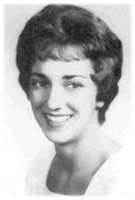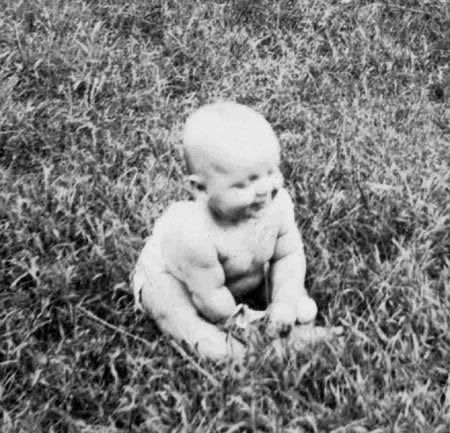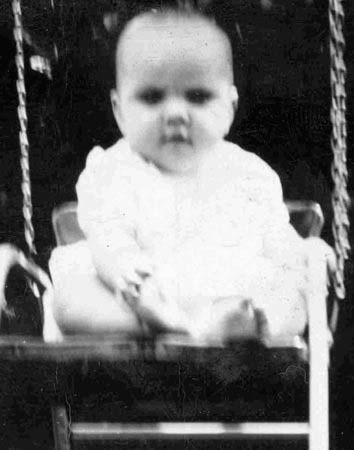
My cousin Aubrey Simmss told me he remembered, as a boy of six, the very night in 1922 when my father told his father about his decision to sell his farm and move to town. My father learned he could get a job in one of the Porterdale Mills and move his family to Porterdale, a mill town near Covington in Newton County Georgia.
 Aubrey said his Dad replied, "Uncle Wilson, I will go to share cropping before I will move my family to a Mill town." Aubrey told about his father's continued refusal to move his family and have his children raised in a mill town when cotton farmers all over the South during the Great Depression and the Boll weevil epidemic were giving up on trying to make a living in farming.
Aubrey said his Dad replied, "Uncle Wilson, I will go to share cropping before I will move my family to a Mill town." Aubrey told about his father's continued refusal to move his family and have his children raised in a mill town when cotton farmers all over the South during the Great Depression and the Boll weevil epidemic were giving up on trying to make a living in farming.
Apparently my father, a hard working and intelligent Christian man, was in failing health and thought this his only option. I am told he worked in the Old Porterdale mill until he became completely disabled. He was bedridden for over a year and died when I was nine.
 (The Old Porterdale Mill) Cousin Jason Simms (the son of my father's sister, Margaret "Maggie" Baird Simms) did somehow manage to send most of his children to college. BTW, I called him and his wife "Cousin Jay" and "Cousin Annie." they were nearly as old as my mother.
(The Old Porterdale Mill) Cousin Jason Simms (the son of my father's sister, Margaret "Maggie" Baird Simms) did somehow manage to send most of his children to college. BTW, I called him and his wife "Cousin Jay" and "Cousin Annie." they were nearly as old as my mother.
Aubrey and I both grew up proud of the same grandfather. Colonel William Baird was a confederate Army Officer. If I recall correctly, William Baird was a lieutenant in the Confederate Army. In the devastated South the few returning wounded soldiers were proudly called "Colonel."
In retrospect, I think the reluctance to live in a mill town was a "Baird" thing. I do not know whether or not it was a good move, but it was the only one available to my family and many others in the southern states. The textile industry moved South looking for less expensive labor and found it in the war-torn southland part of the United States.
My mother told me one day she felt she had arrived at "the jumping off place" when they moved into one of the mill houses "behind the mill."
Mama often reminded me I came from "good stock, " meaning our ancestors had been owners of their own housing. Her well educated cousin, Opal Ficquit, was the wife of the Newton county school superintendent and drove her car out to visit Mama often. Mama never drove a car and neither we, nor most of our neighbors owned a car. By the time i became a teenager, more cars were on our roads.
Opal Lee(college educated)and Ieula Dick (my mother) two of the granddaughters of Rev. Bogan Mask, a properous farmer (for the times) and a Methodist preacher, had been raised on neighboring farms in Fayette County. My mother and her siblings were the poorer family, raised by a widowed mother, Elizabeth Mask Dick. Mama's father, Charles Dick, had died of pneumonia as a young man when Ieula was only 18 months old and her mother was pregnant with her eight child, a son.
I was interested a few years ago when Ferrell Sams, a well known Georgia writer and medical doctor from Fayette County, published his book, Epiphany. In the book he has Bogan Mask as a preacher who bought a slave for the purpose of granting freedom to him. This had been a family story.
Mama was well aware that the country and the world at that time, not only discriminated against people of different races but classes as well. In our egalitarian society, we would do well to try to put these years in the context of widespread illiteracy and worldwide serfdom. People born into a world of class and race divisions accept it as a part of life. (I will write later about how Charles and I began to take some licks for our approval of integration and our work for the breakdown of segregation between the races before it became a politically correct posture.)
When I was a child, we were taught in our civics classes in school about the three economic classes: Upper, Middle Class and Lower Class. I remember one day when this unit came up. One little boy raised his hand and said to the teacher, " We are the Middle Class?" My goodness, we knew people who were "poorer! The teacher paused and tried to find words to get around the label. I remember well knowing the teacher thought we were a part of the Lower Class. They call it "working class" now.
It seems that a family must have lived in the Porterdale Textile village for some time prior to renting a house more to their liking. After a few years we moved to Ivy Street, which was in front of the Osprey plant and had newer houses and was considered a better neighborhood.
 (Osprey Mill) My brief memories of life on Ivy Street include a painful bee sting and a new pair of shoes. We seem to have always had a porch swing that would seat three people. I remember sitting on the swing on our Ivy Street porch when a bee sting sent me screaming to my mother in the house.
(Osprey Mill) My brief memories of life on Ivy Street include a painful bee sting and a new pair of shoes. We seem to have always had a porch swing that would seat three people. I remember sitting on the swing on our Ivy Street porch when a bee sting sent me screaming to my mother in the house.
 I also remember getting a new pair of black patent leather slippers while we lived on Ivy Street. I was walking down the street holding Mary's hand. I must have been about four and Mary fourteen. I could hardly walk for looking down at my new shoes.
I also remember getting a new pair of black patent leather slippers while we lived on Ivy Street. I was walking down the street holding Mary's hand. I must have been about four and Mary fourteen. I could hardly walk for looking down at my new shoes.
Apparently my delight with the new shoes embarrassed Mary or perhaps she was afraid I would fall down. Anyway, as we walked, she kept reminding me to stop looking down at my shoes.
We lived on Ivy Street until a larger house became vacant on Hazel Street which ran parallel to Ivy just one street over. Much of my memories of Porterdale center on Hazel Street. Our house was one of the "new houses" built between the older houses, so it took up much of the yard space. But there was still enough yard for mama to have flowers growing everywhere and room for children to play in the back alley or front unpaved road that saw few cars and an occasional horse and buggy.
We thought Hazel Street the perfect location. We called it "our corner." Wonderful neighbors whose children were loved and disciplined: Albert and Blance Fincher's children were my playmates - Hazel, Dorothy and Lamar. Mr and Mrs Parnell and my good friends, E. F. Parnell and Mamie Miller. The Hornings with Guy, Sybil and Hazel, The Moores (Obie and Grace, Obie Jr. and Billie.) The Martins, Capes, Loyds.
I remember especially being close neighbors to Blanche Fincher (Hazel, Dorothy and Lamar's mother) and Mrs. Parnell (Mamie Miller's and E.F. Parnell's mama.)
Mrs. Parnell also had two older children by an earlier marriage: a son, Henry and a daughter, Lois, who married Woodrow Rogers. Henry had married an older woman, a "grass widow." What is a grass widow? A divorced woman (of which there were few in those days) was said to be a "grass widow." Henry's first wife was very slim and flat chested and had bright red hair that was said to have been “dyed.” They had no children and later divorced.
As I remember, some of the women in the neighborhood accepted Henry's divorce from the "grass widow" without problem because he was, they reasoned, "not Biblically married in the first place." Today we would consider this discrimination (a word we probably had never heard then), but I think the harshness or gossip toward Henry's first wife was that the neighbors felt this "older, more experienced woman" had taken advantage of the teenaged Henry.
Later, Henry married a pretty brunette his own age. I remember her name was Maggie. Henry and Maggie, in due time had a son. When i was eleven or twelve, I would occasionally go with my playmate Mamie to visit them and play with their beautiful baby boy.
Other neighbors were the Hornings, who had a son, Guy, and two daughters, Hazel
and Sybil. Mrs. Horning's mother "Grannie Brooks" lived with them. Grannie Brooks
was known in the neighborhood as devoutly Christian. I remember her as a boxlike short woman in long starched print dresses with her long gray hair pulled back in a large bun.
One day Grannie Brooks got very sick, and they sent for Dr. Baxley and Mama.
When Mama returned, I heard her tell my older sister that Grannie Brooks's bowels were impacted, and Dr. Baxley had "picked it out of her." Grannie Brooks had said, "Dr. Baxley, pray for me." Dr. Baxley brought a little levity into the sick room when he replied, “Grannie, you pray and I will pick." This is definitely more than you want to know! It is amazing what children hear and remember!
Hazel Street provided a slightly closer walk to school, church, post office and the few stores in town; one grocery store and one drug store. The Pharmacy had a soda fountain with ice cream cones going for five cents. However, in those days, nickels had to counted. We did not often patronize the soda fountain, It was a special treat on occasion.
One thing I remember buying at the grocery store was a package of six small cinnamon rolls for five cents. As delicious as my yeast coffee cakes are, they do not compare with the taste of those rare cinnamon rolls of my childhood memory.
One day Mama sent me to the store to get three cans of some kind of food. I keep thinking it was salmon. Was salmon ever just ten cents a can? I started up the hill home with the three cans of food and sat down for a few minutes the steps of the Methodist church we attended. The steps to the church came all the way down to the sidewalk that went down to the store.
I counted my change and realized the clerk had given me five cents too much change. I would have to go back to the store to give the man his nickel. When I handed the man his money and told him he gave me too much change he laughed and told me the cans were three for twenty five cents.
One of the benefits of not owning much is the simplicity of moving. Sometime after my father's death, we moved down and across the street from number 32 to 45 Hazel Street. One just scrubs the floors and any spots off the wall of their new residence. After it is all dried, my brothers carried (or toted) the beds, table and chairs down to the new place. There may be a need to drive another nail on the back of a door to hang the few clothes.
The Capes, Loyds, Browns, and Martins were also our long-time neighbors , along with the Finchers, Parnell's and Moore's on "our corner" of Hazel Street. We referred to this section of town as "our corner."
If we had owned the house, the block or the whole town, at least from a child’s point of view, it could not have been more ”ours” nor more “home."
Oh, the benefits of lack of ownership!
 Joan was a rising senior in High School when we uprooted her from Griffin High School, a small city school where her friends, including a “boy friend” lived. We moved to Ellijay, a small mountain town in North Georgia. If you have ever had to move a teen away from friends you know Joan was not a happy camper.
Joan was a rising senior in High School when we uprooted her from Griffin High School, a small city school where her friends, including a “boy friend” lived. We moved to Ellijay, a small mountain town in North Georgia. If you have ever had to move a teen away from friends you know Joan was not a happy camper. As an aside, an old friend from Charles home town was a quaint never married nurse who was the epitomy of the Hollywood stereotype of “Old Maid. When our wonderful "Miss Weaver" heard we were moving to Ellijay she remarked, “I've heard they sure mash a lot of corn up there.”
As an aside, an old friend from Charles home town was a quaint never married nurse who was the epitomy of the Hollywood stereotype of “Old Maid. When our wonderful "Miss Weaver" heard we were moving to Ellijay she remarked, “I've heard they sure mash a lot of corn up there.” Finally we got to the Ellijay city limits. Charles, in his own exuberant way said, “The population of Ellijay has now increased by nine.“ Joan, who had been very quiet finally spoke, “It has probably doubled.”
Finally we got to the Ellijay city limits. Charles, in his own exuberant way said, “The population of Ellijay has now increased by nine.“ Joan, who had been very quiet finally spoke, “It has probably doubled.”


 The present name of Wesleyan College was adopted in 1919.
The present name of Wesleyan College was adopted in 1919.

 Aubrey said his Dad replied, "Uncle Wilson, I will go to share cropping before I will move my family to a Mill town." Aubrey told about his father's continued refusal to move his family and have his children raised in a mill town when cotton farmers all over the South during the Great Depression and the Boll weevil epidemic were giving up on trying to make a living in farming.
Aubrey said his Dad replied, "Uncle Wilson, I will go to share cropping before I will move my family to a Mill town." Aubrey told about his father's continued refusal to move his family and have his children raised in a mill town when cotton farmers all over the South during the Great Depression and the Boll weevil epidemic were giving up on trying to make a living in farming.

 I also remember getting a new pair of black patent leather slippers while we lived on Ivy Street. I was walking down the street holding Mary's hand. I must have been about four and Mary fourteen. I could hardly walk for looking down at my new shoes.
I also remember getting a new pair of black patent leather slippers while we lived on Ivy Street. I was walking down the street holding Mary's hand. I must have been about four and Mary fourteen. I could hardly walk for looking down at my new shoes.
